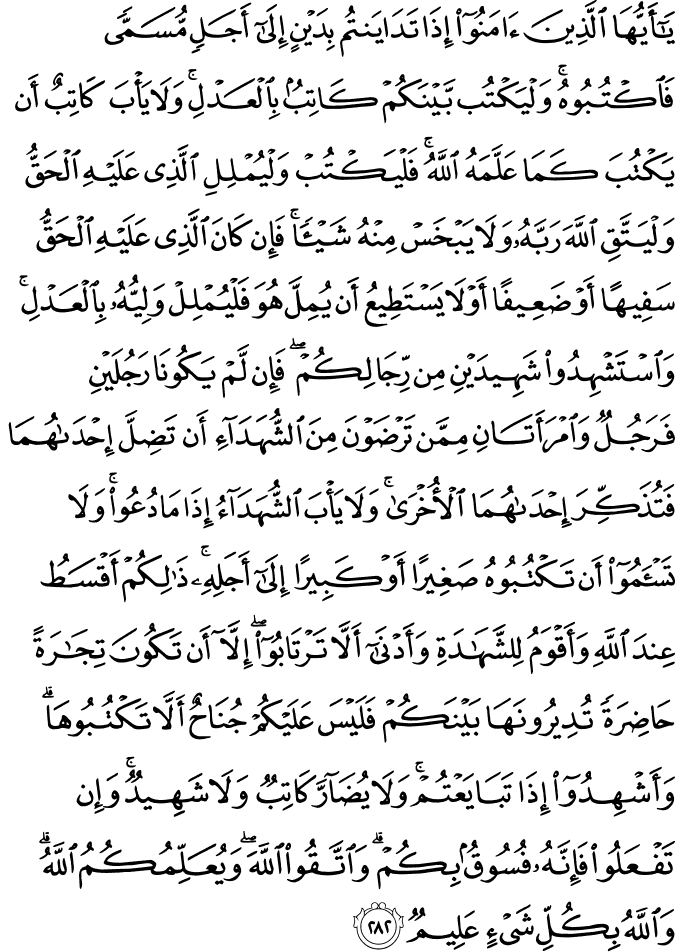The longest verse in the Quran is verse 282 of Surah no. 2 or Surah 2:282.
Surah 2 is also called Surah al Baqarah where 'baqarah' means a heifer or cow. In Bahasa Indonesia they translate it as 'sapi betina'.
Here is the verse in Arabic and its English translation. Then some comments.

Surah 2:282 O you who have believed, when you contract a debt for a specified term, write it down. And let a scribe write [it] between you in justice. Let no scribe refuse to write as Allah has taught him. So let him write and let the one who has the obligation dictate. And let him fear Allah, his Lord, and not leave anything out of it. But if the one who has the obligation is of limited understanding or weak or unable to dictate himself, then let his guardian dictate in justice. And bring to witness two witnesses from among your men. And if there are not two men [available], then a man and two women from those whom you accept as witnesses so that if one of the women errs, then the other can remind her. And let not the witnesses refuse when they are called upon. And do not be [too] weary to write it, whether it is small or large, for its [specified] term. That is more just in the sight of Allah and stronger as evidence and more likely to prevent doubt between you, except when it is an immediate transaction which you conduct among yourselves. For [then] there is no blame upon you if you do not write it. And take witnesses when you conclude a contract. Let no scribe be harmed or any witness. For if you do so, indeed, it is [grave] disobedience in you. And fear Allah. And Allah teaches you. And Allah is Knowing of all things.
My Comments:
A few points to note here:
1. The words write and writer (scribe) are mentioned nine times in this verse, underscoring the importance of writing and the importance of the written word.
Bear in mind that this piece of social necessity was taught over 1400 years ago. There is a strong emphasis being placed on writing contracts for a fixed time frame (ajalin musamman).
There should not be endless contracts or contracts that seem to have no end. For example like some of our highway toll concessions or the crony concession contracts.
A contract must have a beginning and an end.
2. The verse starts with a specific mention of incurring debt or loans ("dai-nin") between people. And then it goes into detail and at length about how to write down the loan. Meaning that debts or loans are an accepted part of transactions between ordinary people or the lay people. (Yet there are people who say there are no loans in "Islamic banking".)
Sadly the importance of written agreements or written contracts between the lay people have little impact in societies where literacy rates are generally low or where there is a weak literary tradition. There is less regard for written agreements in such societies. Even when something is written down in black and white it is often ignored, especially by those who are in breach of what was written down in an agreement.
Again we see this aplenty in Islamic societies as well, especially among the ruling classes. The ruling classes often break their own laws and get away with it. Or they behave as if the written laws only apply to the ordinary people.
When we say "regard for the law" what is actually meant is regard for the written word because all laws must be written down. Just like the Quran - it has been written down as a kitab or book full of words.
People who disregard the law are really disregarding the idea of upholding written words.
And the written word in turn is basically to make us respect what has been agreed upon. Meaning to make us trustworthy.
This also means that to just rely on spoken words or verbal agreements is not advisable at all. Hence the terrible track record of what becomes lies spoken by politicians.
Since what they say is hardly written down, politicians will say anything and everything. They can deny everything (including media reports) with "I have been misquoted". They know they will not be held accountable for what they say with their mouths.
To close, lets go back to weak societies or poor societies especially the Islamic societies. They are also poor because there is less regard for the written word. Or for the written agreement. In Tamil there is a phrase "writing on water" implying 'So what if it is written down? Who cares?"
So they revert to endless talking. Which gets them nowhere.
Artikel ini adalah pandangan penulis dan tidak semestinya mewakili MMKtT.


No comments:
Post a Comment
Note: Only a member of this blog may post a comment.